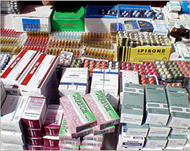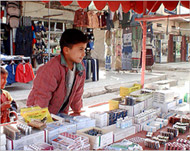Baghdad, where drugs are sold like sweets
Asaad Mahdi Ali started washing down Valium with alcohol in 1992.

As his tolerance to a few pills grew, Ali started gulping down a deadly cocktail of Artane, Ativan and Valium. Sometimes he would take as many as 15 pills a day.
His addiction grew amid the privations of the Iraqi people after the first Gulf War. As UN sanctions began to take their toll on the economy, Iraqis found solace in anti-depressants sold on the black market.
At the time his pharmacist friend was his main supplier. Now, however, with the breakdown in law and order, highly addictive tranquillisers and anti-depressants are being sold openly in the capital’s markets.
Taken in large quantities, the drugs can cause comas. Withdrawal symptoms include convulsions, sweating and vomiting. They can also damage unborn babies.
Strictly controlled
Before the US-led occupation last March, these drugs were sold at pharmacies on a strictly prescription-only basis. Now they are available from vendors who can barely read the English labels, let alone correctly prescribe them.
“They are sold on the streets,” says Dr Naaman Sarhan Ali, a consultant psychiatrist at Baghdad’s Ibn Rushd Psychiatric Hospital.
Much of it comes from the mayhem following the US invasion when looters wreaked havoc in Baghdad. Stolen medication from hospital, clinics and the health ministry are now reappearing on the streets.
“You can find anything,” says Ali wearily. Insulin, anaesthetic injections, hypertension medications are also available for those seeking a high.
Enter the garbage-filled streets of al-Sadr city, one of the capital’s most impoverished areas and the markets are teeming with illicit drugs.
Big business
The over-populated area’s fish and vegetable market is swarming with flies. Next to it are the rows of carts selling pills, injections, creams and syrups.
 |
|
Bitter pill: Drugs are being sold |
Stacks of brightly coloured capsules are lined up. Held together with elastic bands, they have been long removed from their boxes.
And business is booming. Thirty pills can be purchased for about 500 dinars or 14 US cents. In pharmacies, the same amount is sold for about three times the price.
At the market dealers swiftly deny selling tranquillisers or anti-depressants. “That would be illegal,” they say.
Guns and drugs
But one onlooker tells us that such drugs can be found on other stalls. Someone else warns that the pills are sold in the same alleys where arms dealers run their thriving post-occupation businesses.
“He (an arms dealer) would probably have taken some of those pills so he wouldn’t have a problem shooting you,” he warns.
But there are still plenty of other medications being sold.
Supplier Hamid is suspicious of the new faces. He defiantly offers a wad of tattered papers he says are the receipts for his merchandise.
They were purchased from a “storage centre”, he says. But there are tens of packets boldly stamped with “Not for Sale” in English and the “Iraqi Health Ministry” in Arabic.
Hamid claims his brother is a pharmacist who has taught him how to prescribe medications. I ask him about one packet and he says it is used for “stomach aches”. A pharmacist later tells me it is an antibiotic for sore throats.
Price war
Customers are unconcerned that the drugs are being kept out in the sun and the expiry date on some is within a few months or unclear on others.
 |
|
Qatham helps his father sell |
Qatham, 10, is manning another stall a few metres from Hamid. He has been working at his father’s stand for the past two years. When asked what the Viagra pills are used for, Qatham replies seriously “to enhance sexual performance,” prompting a laugh from the gathered crowd.
When his father, Abu Ali, appears he quickly produces papers which he also says are the receipts for his goods. “Some of them are from non-government organisations (NGOs),” he claims. But his stand also includes packets stamped “Not For Sale” and the “Iraqi Health Ministry”.
Drug abuse
But pharmacies are facing problems of their own, with staff becoming worryingly lax.
At pharmacies in one of Baghdad’s upmarket neighbourhoods, including one by a private hospital, I was able to buy Valium and Artane with almost no questions asked.
One pharmacist asked whether a doctor had recommended Artane but did not ask for a prescription. I informed him that I had “problems” before coming to Iraq and the city’s mood made me feel “tired”.
He asked if my hands were shaking. I said yes and he advised me to take two five milligram pills a day.
Shaking the habit
Ali has no intention of buying any more drugs. He wants to get clean. He checked into the Ibn Rushd hospital, which includes a detox ward, where he met with a psychologist and others like himself to discuss his future.
“I came here by myself,” says the 31-year-old proudly. “And I haven’t taken anything in eight days.”
Although he has tried to convince his friends to kick their habit, they refuse to listen. While he may be able to supply his addictions more easily today, Ali is determined to change.
“I want to build a future,” he says.